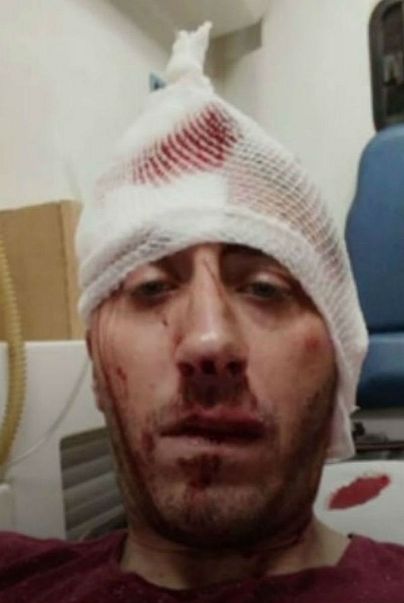A recent attack on a journalist in the city of Banja Luka, in Bosnia and Herzegovina, has sparked protests across the country and put journalists’ safety in the spotlight.
A recent attack on a journalist in the city of Banja Luka, in Bosnia and Herzegovina, has sparked protests across the country and put journalists’ safety in the spotlight.
It was Sunday evening when Vladimir Kovacevic, a journalist for BN Television, was brutally attacked on his way home from work by two unknown assailants wielding expandable batons.
Due to serious head injuries, Kovacevic was admitted to the hospital that evening. The Banja Luka District Prosecutor's Office announced on Monday that the attack will be treated as attempted murder.
But the case is far from unique.
The incident marked the 41st reported attack against a journalist in Bosnia and Herzegovina since the beginning of 2018. Five of these attacks, according to the Bosnian Journalists’ Association, was preceded by death threats targeting the victims.
“The increase in such incidents indicates an alarming situation in terms of working conditions for journalists, which seriously undermines the freedom of the media and the right of citizens to objective information,” the Institution of Human Rights Ombudspersons of Bosnia and Herzegovina said after the attack.
Aladin Abdagic, editor-in-chief of the Center for Investigative Reporting (CIN) in Sarajevo, said journalists in Bosnia and Herzegovina work in “very dangerous” conditions.
“Very often there are examples of attempted discreditation of journalists and their media houses because of the work they do,” Abdagic added.
The Bosnian Journalists’ Association pointed out that many cases of violence against journalists and media organisations have never been prosecuted.
In a statement after the Kovacevic attack, the association said many attacks against journalists in Republika Srpska, one of two constitutional and legal entities in Bosnia and Herzegovina, were enabled by politicians' rhetoric against journalists.
One politician with a long history of conflicts with journalists and the media is Milorad Dodik, the leader of Republika Srpska and president of the ruling Party of Independent Social Democrats (SNSD).
Dodik has banned some journalists and media organisations from public conferences held by his government, and has falsely accused several journalists of being spies and enemies funded by the West.
“Dodik has often focused his public and political activities on journalists and the media, humiliating and insulting them in the most primitive ways”, the Bosnian Journalists Association said.
“He declared them as enemies, spies and foreign mercenaries, turning them into ‘live targets’ and creating space for direct violence. These threats and attacks have never been sanctioned.”
Banja Luka-based journalist Aleksandar Trifunovic told Euronews that journalists do not feel protected due to an “atmosphere of lynching”, and lamented the lack of action that follows important journalism in the country.
“Conditions have been created in which the truth is not important. Journalists can publish a serious article about multi-million [euro] embezzlement or misuse of politics without causing any reaction. The meaning of a written word has been lost, because it does not cause any consequence,” he said.
Abdagic believes that attacks and threats against journalists are intended to distract them from their work.
CIN has filed several complaints to authorities over threats and attacks on its journalists.
One such case was filed against a doctor from a private clinic in Sarajevo who posted insults and fabricated stories about CIN’s journalists online after they produced two investigative articles about his work and that of other medical centres in the Bosnian capital.
In July 2018, the municipal court in Sarajevo issued a first instance verdict against the doctor for insult and slander.
Several government officials have joined human rights organisations and the international community in condemning the attack against Kovacevic.
But for many, this is not enough.
In towns across the country, people working in the media have gathered in recent days to call on authorities to conduct an unbiased and fair investigation into the case, and to protect journalists from future attacks.












